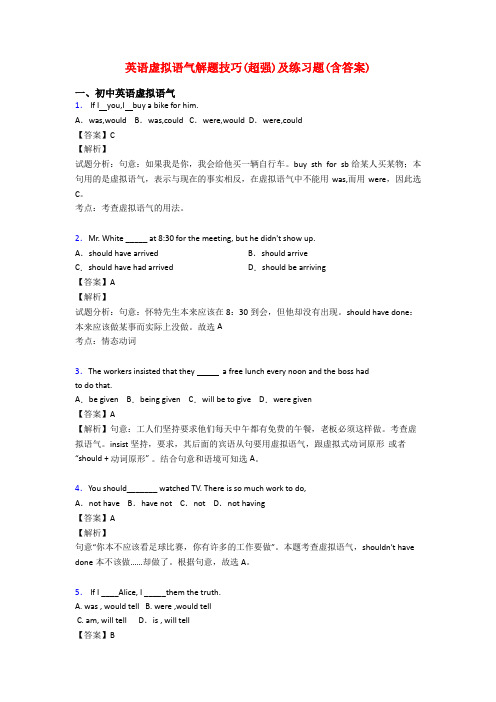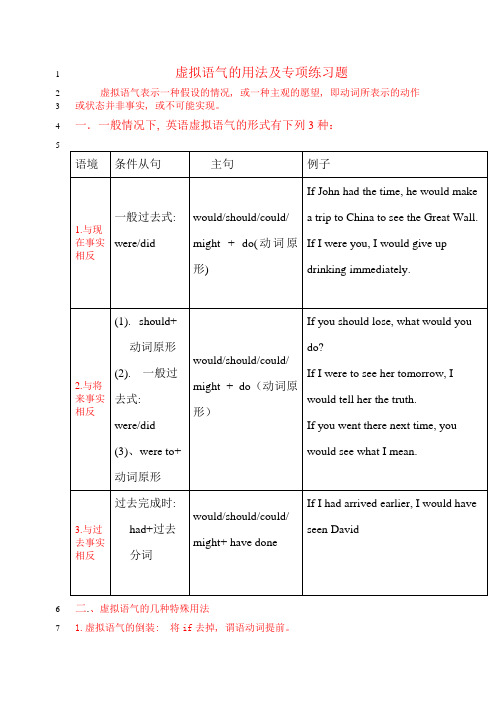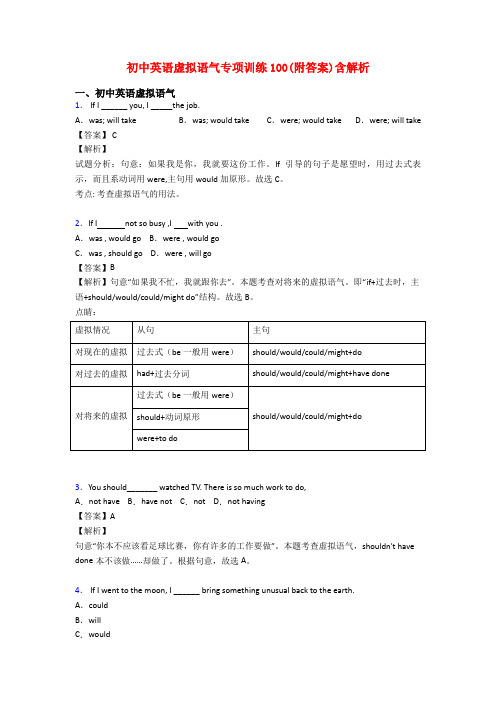虚拟语气的用法及专项练习题
英语虚拟语气解题技巧(超强)及练习题(含答案)

【答案】D
【解析】
试题分析:句意:如果天气是好的,我们的运动会就不会推迟了。这里是虚拟语气,根据wouldn’t可知这是对现在的虚拟,在条件状语中对现在的虚拟用were;put down镇压,记下;put up提供;put off推迟。根据句意故选D。
考点:考查虚拟语气的用法。
9.If I _______ you , I _______ do that .
考点:虚拟条件句。
10.If I ________ invited tonight, I would go to the dinner party.
A.was B.were C.am D.is
【答案】B
【解析】
试题分析:句意:如果我今晚受到邀请,我会去参加晚宴的。由整个题干可知,现实情况与事实相反,是非真实的情况,是虚拟语气,虚拟语气中be都用were,故选B。
考点:考查虚拟语气。
18.If I ______ you, I _____the job.
A.was; will takeB.was; would takeC.were; would take D.were; will take
【答案】C
【解析】
试题分析:句意:如果我是你,我就要这份工作。If引导的句子是愿望时,用过去式表示,而且系动词用were,主句用would加原形。故选C。
考点:考查虚拟语气的用法。
12.If I were invited to the party,I _______ a red skirt.
A.will wear B.wear C.would wear
【答案】C
【解析】
试题分析:如果我被邀请参加聚会,我会穿红色的裙子。此处考查虚拟语气。句中,主句和从句的谓语都要用虚拟语气,与现在事实相反的假设,从句(条件句)动词过去式(be一般用were);主句(结果句)should /would/ could/ might +动词原形。故答案为C。
虚拟语气解析以及练习题答案详细解答

虚拟语气解析及练习与答案详解虚拟语气一、虚拟语气的运用练习题及答案解释The millions of calculations involved, had they been done by hand,______all practical value by the time they were finished.A.could loseB. would have lostC. might loseD. ought to have lost解析:这个句子中含有一个省略if,把助动词提前到主语they之前的虚拟条件句,该条件句表示对过去情况的假设,而主句中by the time they were finished表明主句也应该是对过去发生的情况的假设,因而应该选(B)would have lost为正确答案。
2. Had Paul received six more votes in the last election, he our chairman now.A. must have beenB. would have beenC. wereD. would be解析:这道题目是一个混合虚拟语气的句子。
条件句省略了if,把助词had提前到主语前面,表示对过去情况的假设,而主句中now表明了对现在情况的假设,所以应选would(should, could, might)+动词原形这种表达形式。
四个选项中只有(D)是正确表达形式,故为正确答案。
3. If you Jerry Brown until recently, you’d think the photograph on the right was strange.A. shouldn’t contactB. didn’t contactC. weren’t to contactD. hadn’t contacted解析:until recently,因此(D)是正确答案,而主句是隐含的对现在情况的假设,该句是一个混合虚拟条件句。
英语高考虚拟语气专项练习60题(附答案)

一.虚拟语气用于条件状语从句中1. 表示与现在事实相反或不可能发生:条件状语从句:一般过去时(虚拟语气中be→were)主句用:would(should, could, might)+动词原形。
If we had time now, we would read it again.If I were you, I would work hard.2. 表示与过去事实相反或不可能发生:条件状语从句:had+过去分词;主句:would(should, could, might)+have+过去分词。
If he had taken my advice, he would have succeeded in the test.If I had known your telephone number then, I would have called you.3. 表示与将来的事实可能相反或不可能发生:条件状语从句:①一般过去时②should +动词原形③were to+动词原形;主句:would(should, could, might)+动词原形。
If it should rain, the crops would be saved.If it were to snow tomorrow, they would not go out.P.S 虚拟条件句的特殊情况(1). 混合/错综型虚拟语气当条件状语从句表示的行为和主句表示的行为所发生的时间不一致时,称为‘错综条件句’,动词的形式要根据它所表示的时间作出相应的调整。
If you had followed my advice, you would be better now.(从句说的是过去,主句是现在)If I were you, I would have taken his advice.(从句是现在,主句是过去)(2)省略if的虚拟语气如果从句中含有were/ should/ had时,则可以把这三个词置于句首,省略if.采用倒装语序。
英语:高考虚拟语气专项练习60题附问题详解 1

一.虚拟语气用于条件状语从句中1. 表示与现在事实相反或不可能发生:条件状语从句:一般过去时(虚拟语气中be→were)主句用:would(should, could, might)+动词原形。
If we had time now, we would read it again.If I were you, I would work hard.2. 表示与过去事实相反或不可能发生:条件状语从句:had+过去分词;主句:would(should, could, might)+have+过去分词。
If he had taken my advice, he would have succeeded in the test.If I had known your telephone number then, I would have called you.3. 表示与将来的事实可能相反或不可能发生:条件状语从句:①一般过去时②should +动词原形③were to+动词原形;主句:would(should, could, might)+动词原形。
If it should rain, the crops would be saved.If it were to snow tomorrow, they would not go out.P.S 虚拟条件句的特殊情况(1). 混合/错综型虚拟语气当条件状语从句表示的行为和主句表示的行为所发生的时间不一致时,称为‘错综条件句’,动词的形式要根据它所表示的时间作出相应的调整。
If you had followed my advice, you would be better now.(从句说的是过去,主句是现在)If I were you, I would have taken his advice.(从句是现在,主句是过去)(2)省略if的虚拟语气如果从句中含有were/ should/ had时,则可以把这三个词置于句首,省略if.采用倒装语序。
初中虚拟语气(清晰版)

虚拟语气的用法及专项练习题1虚拟语气表示一种假设的情况, 或一种主观的愿望, 即动词所表示的动作2或状态并非事实, 或不可能实现。
3一.一般情况下, 英语虚拟语气的形式有下列3种:45二.、虚拟语气的几种特殊用法61.虚拟语气的倒装: 将if去掉, 谓语动词提前。
7●如:8I..wer.you..woul.giv.u.drinking.=Wer..you..woul.giv.u.drinking.9●I..ha.arrive.earlier..woul.hav.see.David..Ha..arrive.earlier..woul.hav.se10e.David.112. 有时条件从句中的动作和主句中的动作发生的时间不一致, 如:12If he had followed the doctor’s advice, he would be quite all right now.13(if从句是对过去的虚拟, 主句是对现在的虚拟。
)14If I were you, I would have gone home.15(if从句是对现在的虚拟, 主句是对过去的虚拟。
)1617注意: 在此结构中that不可省略;should省不省均可。
18He suggested that they (should ) stop smoking.19上述动词的名词形式出现时, that 引导的从句仍用虚拟语气。
20He made a request that they (should ) stop smoking.21注意:22* insist有两个意思, 当表示“坚持让某人做某事”(含命令口吻)时, 23that从句用虚拟, 如: He insists that we (should) go home now.24当表示“坚持某种说法”时, that从句用陈述语气。
25He insists that he is right.2627It is important that you (should) follow the doctor’s o rders.28It is right that you should have done your homework.29注意: wish与hope接宾语从句的区别在于: hope表示一般可以实现的30希望, 宾语从句用陈述语气。
虚拟语气总结附练习及答案

虚拟语气简介虚拟语气用来表示说话人的主观愿望或假想,而不表示客观存在的事实,所说的是一个条件,不一定是事实,或与事实相反。
虚拟语气通过谓语动词的特殊形式来表示。
英语中的语气分为陈述语气、祈使语气、虚拟语气三类。
在表示虚假的、与事实相反的或难以实现的情况时用虚拟语气,表示主观愿望或某种强烈情感时,也用虚拟语气。
即当一个人说话时欲强调其所说的话是基于自己的主观想法,愿望,假想,猜测,怀疑或建议,而不是根据客观实际,就用虚拟语气。
①错综时间条件句:当条件状语从句表示的行为和主句表示的行为所发生的时间不一致时,被称为错综时间条件句,动词的形式要根据它表示的时间作出相应的调整。
如:If you had followed my advice just now, you would be better now.If you had studied hard before, you would be a college student now.②if省略句在条件句中可以省略if, 把were, had, should提到句首,变成倒装句式。
如:If I were at school again, I would study harder.→Were I at school again, I would study harder.如果我还有上学的机会,我会更加努力学习。
If you had come earlier, you would catch the bus.→Had you come earlier, you would catch the bus.如果你来得早点,你就能赶上公共汽车。
If it should rain tomorrow, we would not go climbing.→Should it rain tomorrow, we would not go climbing.如果明天下雨的话,我们就不能登山去了。
初中英语虚拟语气专项训练100(附答案)含解析

初中英语虚拟语气专项训练100(附答案)含解析一、初中英语虚拟语气1. If I ______ you, I _____the job.A.was; will take B.was; would take C.were; would take D.were; will take 【答案】 C【解析】试题分析:句意:如果我是你,我就要这份工作。
If引导的句子是愿望时,用过去式表示,而且系动词用were,主句用would加原形。
故选C。
考点: 考查虚拟语气的用法。
2.If I not so busy ,I with you .A.was , would go B.were , would goC.was , should go D.were , will go【答案】B【解析】句意“如果我不忙,我就跟你去”。
本题考查对将来的虚拟语气。
即“if+过去时,主语+should/would/could/might do”结构。
故选B。
点睛:3.You should_______ watched TV. There is so much work to do,A.not have B.have not C.not D.not having【答案】A【解析】句意“你本不应该看足球比赛,你有许多的工作要做”。
本题考查虚拟语气,shouldn't have done本不该做……却做了。
根据句意,故选A。
4. If I went to the moon, I ______ bring something unusual back to the earth.A.couldB.willC.wouldD.shall【答案】C【解析】试题分析:此题考查if引导的条件状语从句的相关知识。
根据语境可知此句的含义是如果我去月球,我会带回一些不同寻常的东西。
这个假设成立的几率很小,故看为虚拟语气。
根据语法知识可知从句要用一般过去时,主句要用过去将来时,过去将来时的基本构成would+动词原形,故选C。
虚拟语气讲解及练习题(含答案和解释)

高中英语虚拟语气讲解及练习虚拟条件句就是对现实条件的一种虚拟假设,所假设的条件一般不符合事实或与事实相反或在现实中发生的可能性极小。
根据时间的不同,虚拟条件句可分为三种,即与现在事实相反的虚拟条件句、与过去事实相反的虚拟条件句(1)表示与现在事实相反If I had enough money now, I would lend it to you.(2)表示与过去事实相反If he had taken your advice, he wouldn’t have made such a bad mistake.(3)表示与将来事实相反I would go shopping with you if it were to be Sunday tomorrow.1. 虚拟条件句的倒装在虚拟条件句中,为了强调所假设条件的虚拟性,或突出说话人的一种主观愿望,虚拟条件句可用倒装结构。
虚拟条件句的倒装是通过去掉if,把条件从句谓语中的助动词、情态动词或系动词放在句首实现的。
例如:Had I been(= If I had been ) in that situation, I would not have let the thief escape away with so much money.Should there be (= If there should be) a drought, what should we do at that time ?2. 错综时间条件句有时条件从句的动作和主句的动作发生的时间并不一致,这时谓语动词的形式应根据它所要表示的具体时间来确定。
例如:If we hadn’t been working hard in the past few years ,thing s wouldn’t be going so smoothly.3. 含蓄条件句有时假设的情况并不以条件从句的形式表现出来,而是通过某个介词或介词短语(如:with,otherwise,without,but for,in that position)、上下文或其它方式表现出来。
- 1、下载文档前请自行甄别文档内容的完整性,平台不提供额外的编辑、内容补充、找答案等附加服务。
- 2、"仅部分预览"的文档,不可在线预览部分如存在完整性等问题,可反馈申请退款(可完整预览的文档不适用该条件!)。
- 3、如文档侵犯您的权益,请联系客服反馈,我们会尽快为您处理(人工客服工作时间:9:00-18:30)。
虚拟语气的用法及专项练习题虚拟语气表示一种假设的情况,或一种主观的愿望,即动词所表示的动作或状态并非事实,或不可能实现。
英语虚拟语气的形式有下列几种:一 .虚拟语气用于条件状语从句注意:主句中的should通常用于第一人称,would可用于任何人称,同时也可根据意思用情态动词could,might等代替should,would。
1.与现在事实相反(1) If had the time, John would make a trip to China to see the Great Wall.(2) If I were you, I would give up drinking immediately.2.与过去事实相反If I’d known that it was going to rain, I would never have gone for a walk in the country. 3.与将来事实相反If it were to/should rain tomorrow,the meeting would be putoff.If you went there next time, you would see what I mean.4.错综时间虚拟语气当条件状语从句表示的行为和主句表示的行为所发生的时间不一致时,动词的形式要根据它所表示的时间来调整。
例如:If I were you, I would have gone home.If you had followed the doctor's advice, you would be quite all right now.(从句说的是过去,主句指的是现在。
)If the weather had been more favorable ,the crops would be growing still better.状语从句1. 方式状语as if(as though)如果从句表示与现在事实相反,谓语动词用一般过去时;表示与过去事实相反,谓语动词用"had+过去分词";表示与将来事实相反,谓语动词用"would(might,could)+动词原形"。
例如: (1) He looks at me as if I were mad. (2) He spoke English so fluently as if he had studied English in England.但as if(as though)后的从句也常用陈述语气,这是因为从句中的情况往往是可能发生的或可能被设想为真实的。
例如:It looks as if our side is going to win.2. 目的状语in order that,so that , lest ,for fear that等从句谓语动词用" may/might,can/could)+动词原形"。
例如: (1) She listened carefully in order that she might discover exactly what he wanted. (2) We hid behind some bushes for fear that passer-by should see us.3. 连词引导的条件状语从句:in case , unless ,supposing ,providing, on condition that从句谓语动词用(should)或" might, could)+动词原形"。
二.虚拟语气用于宾语从句1.Suggest, advise等动词之后宾语从句须用虚拟语气,其句子结构如下:注意:在此结构中that不可省略;should省不省均可。
He suggested that they (should ) stop smoking.They demanded that the black people should be treated as well as white people.如果that引导的从句所表达的内容是事实,也可用陈述语气。
He insists that he is right.注意:insist作"力言"、"强调"解时,宾语从句不用虚拟语气。
只有当insist作"坚持(应该)"解时,宾语从句才用虚拟语气。
例如(1) Mike insisted that he had never stolen anything. (2)I insisted that you give me my money back.2."wish+宾语从句"表示不能实现的愿望,汉语可译为"可惜……"、"……就好了"、"悔不该……"、"但愿……"等。
表示现在不能实现的愿望,从句的谓语动词用过去式;表示将来不能实现的愿望,用"would(could)+动词原形";表示过去不能实现的愿望,用"had+过去分词"或"(could)would+have+过去分词"。
例如:wish的用法注意:wish与hope接宾语从句的区别在于:hope表示一般可以实现的希望,宾语从句用陈述语气。
wish表示很难或不大可能实现的希望,宾语从句用虚拟语气。
试比较:We hope they will come,(We don’t know if they can come.We wish they could come,(We know they are not coming.3.虚拟语气在would rather/would sooner/would just as soon后接从句:I'd rather you paid me now.(从句用过去时指现在)I would rather they came tomorrow.(从句用过去时指将来)I'd rather she hadn't done that.(从句用过去完成时指过去)(此句中的would可看作是表愿望的实义动词)三.虚拟语气用于主语从句在主语从句中,谓语动词的虚拟语气结构用"should+动词原形"的结构,表示惊奇、不相信、惋惜、理应如此等。
例如:It is necessary( appropriate crucial desirable dreadful essential important improper incredible indispensable insistent natural preferable possible probable proper right significant surprising strange tragic urgent vital wrong etc.)that we should clean the room every day.It was a pity(a shame,no wonder,etc.)that you should be so careless.It will be desired(suggested,decided,ordered, requested,proposed,etc.)that she should finish her homework this afternoon.在上述三种主语从句中,should意为"应该"、"竟然",可以省去,但不可换用would。
主句所用动词的时态不限。
注意:这种从句表示的是事实。
如果说话人对这种事实表示惊奇,就可用虚拟语气。
反之,如果不表示惊奇,that从句也可用陈述语气。
例如:It is strange that he did not come yesterday.It is a pity that you can't swim.四.虚拟语气用于表语从句、同位语从句要求:demand request pray insistence requirement建议:suggestion advice proposal recommendation motion命令、决定:order command decision determination resolution其它:plan desire idea necessity preference等名词的表语从句和同位语从句,其谓语动词要用虚拟语气的结构"(should)+动词原形"。
例如(1) We all agreed to his suggestion that we(should)go to Beijing for sightseeing. (2) My idea is that he (should)do exercises first.五、虚拟语气的几种特殊用法1.省掉if的条件从句倒装结构:Had you asked me, I would have told you. (=If you had asked me,…)2.有时虚拟条件不用条件从句而用不定式、分词、介词、名词、连接词或定语从句来表示,如:A true friend would not do such a thing.(=If he were a true friend, he...)(=If there were no water,…)(=If you hadn’t helped me,…)3. 虚拟语气用于定语从句:It’s (high) time that…+动词过去式或should+动词原形,(should 不能省略,be用were)"来表示,意为"(现在)该……"。
如:It’s time (that) you had a hair cut.It’s high time (that) we took some action.4.虚拟语气用于if only引导的感叹句:If only I had taken his advice.我要是听他的话就好了。
If only I were a bird!我如果是一只鸟就好了。
5.虚拟语气用于简单句1)表示说话人谦虚、客气、有礼貌,使语气委婉,常出现在日常会话中。
